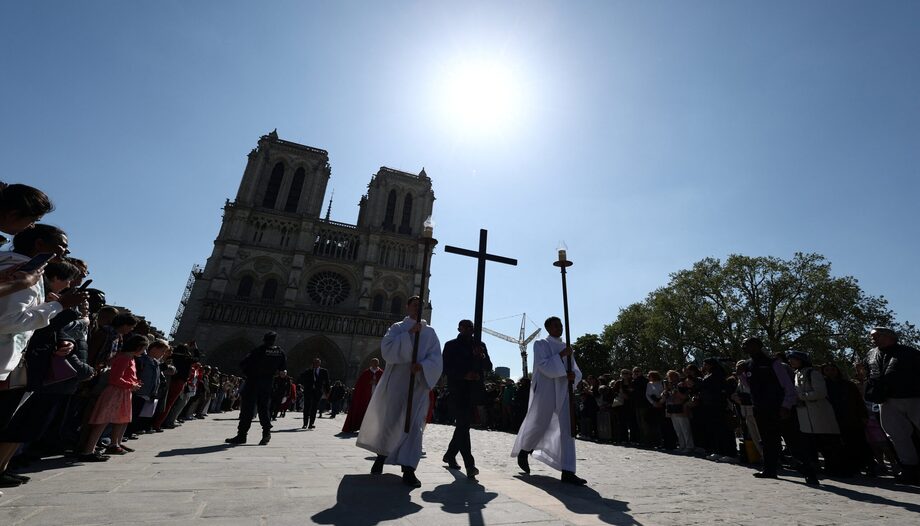- Caroline de Sury (OSV News, Paris). In the face of the controversial 'assisted dying' bill, French Catholic bishops have launched an unprecedentedly strong public campaign urging Catholics to oppose the bill.
The bill, championed by President Emmanuel Macron, is set for a major vote in the National Assembly this May 27 and subsequent days.
The bishops have called on all Catholics in France to take personal action to challenge their representatives in Parliament who are preparing to vote on the bill.
Now separate: palliative care and assisted dying
In June 2024, a previous bill in favor of the euthanasiaThe 'end-of-life' bill was about to be approved in Paris. Macron, who initiated the bill, called it an 'end of life'.law of fraternity'. But on June 9, the president decided to dissolve the National Assembly, and all ongoing legislative processes were halted.
In January, the newly appointed Catholic Prime Minister, François Bayrou, requested that the issues of palliative care and assisted dying, which had previously been united in the same 'end of life' bill, be examined by Parliament in two separate texts. Therefore, since April 9, the Social Affairs Committee of the National Assembly has been examining two separate bills.
While the bill in favor of the palliative carewhile the other bill, which guarantees access to end-of-life care for all patients, enjoys a broad consensus, the other bill, which calls for the legalization of medical assistance in dying, is causing deep divisions within French political parties.
Bishops: opposition to reform
The bishops have been strongly mobilized on the issue of "aid in dying" for more than a year. "It has been years since a social problem or a reform project has mobilized them to this point," noted 'Le Monde' on March 19.
"Through interviews, opinion pieces and appearances on television and radio programs during prime time, the clergy are mobilizing to express their clear and unequivocal opposition to the reform sought by Emmanuel Macron."
"The choice to kill and help kill is not the lesser evil."
In recent weeks, French bishops have intensified their efforts to call on parliamentarians to oppose the introduction of the 'right to die' bill.
On May 6, the outgoing president of the French bishops' conference, the Archbishop of Reims, Éric de Moulins-Beaufort, responded in X to Macron's comments on the 'assisted dying' bill. Macron had addressed the Masons of the Grand Lodge of France the day before, referring to active assistance in dying as a 'lesser evil'.
"No, Mr. President, the choice to kill and help kill is not the lesser evil," Archbishop Moulins-Beaufort replied. "It is simply death. This must be said without lying and without hiding behind words. Killing cannot be the choice of brotherhood or dignity. It is the choice of abandonment and refusal to help to the end. This transgression will weigh heavily on the most vulnerable members and loners of our society".
"No to a pseudo-solidarity to help them disappear".
For his part, the Archbishop of Lyon, Olivier de Germay, appealed to members of Parliament in a May 12 statement: "We need politicians who have the courage to go against the tide" and "have the courage to say no to a pseudo-solidarity that would be tantamount to telling the elderly that we can help them to disappear.
Joint opposition from religious leaders
On May 15, France's religious leaders, including Catholics, Jews, Muslims, Protestants, Orthodox and Buddhists, published their first joint opposition to the proposal. Signed by Archbishop Moulins-Beaufort and published by the Conference of Bishops, the joint statement denounced "grave abuses" and the "radical change" that the introduction of the "assisted dying" bill would entail.
The following day, in the Catholic newspaper 'La Croix', the Archbishop of Tours, Vincent Jordy vice-president of the Conference of Bishops, explained the reasons for the church's opposition to the bill.
One out of two French people do not have palliative care
"We really help people die when we accompany them to the end of their lives," he said. "There is an obvious shortage of caregivers, and one in two French people could say they still don't have access to quality palliative care, which we know reduces requests for death in the vast majority of cases," he said.
Parishes throughout France
On May 17, legislators approved an amendment to the bill to be voted on May 27, creating a new "right to die with assistance". They refused to use the terms 'euthanasia' - because "it was used from October 1939 onwards by Hitler and the Nazis" - and "suicide", to avoid confusion with suicide prevention as it has been commonly understood until now.
On May 18, parishes throughout France distributed posters and leaflets during Sunday Masses, which were also posted on diocesan and parish social media accounts. The parishes thus reinforced the bishops' campaign to oppose the bill. The bishops expressly asked the Catholic faithful to contact their representatives personally.
"Let us not remain silent."
"Let us not remain silent," they insisted. "Let us say no to the legalization of euthanasia and assisted suicide. ... If adopted on May 27, this bill, one of the most permissive in the world, would threaten the most vulnerable and call into question the respect due to all human life."
However, three days later, on May 21, the deputies of the National Assembly adopted the article defining the outlines of the procedure for requesting assistance in case of death, which will be made available even to those who have not yet had access to palliative care.
Vigil and testimonies
That same evening, 12 bishops from the Paris region participated in a vigil and heard testimonies for life at Notre Dame Cathedral in Paris.
In the National Assembly, the debate continued until May 25, before the formal vote on May 27.
—————
Caroline de Sury writes for OSV News from Paris.
————-
This article is a translation of an article first published in OSV News. You can find the original article here.








